Ed Gorman's Blog, page 119
August 18, 2013
New Review Flashpoint
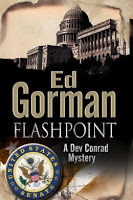
Publishers WeeklyA cynical view of the electoral fourth mystery featuring political consultant Dev Conrad...Everyone has secrets, and Conrad has to unravel enough of them to find a killer and salvage a candidate."
“The Dev Conrad mysteries showcase Gorman’s gifts for creating realistic characters and plotting suspenseful stories.”Booklist on Flashpoint
From Gravetapping: FLASHPOINT by Ed Gorman
Flashpoint is the fourth novel to feature Dev Conrad. Conrad is a former Army Intelligence operative, and current political consultant. He has a cynical political view. The only thing he likes less than politicians are political consultants, but he loves the game. This time Dev is in Illinois where a client is accused of murder. Not so much by the police, at least not publicly, but definitely by the news media. Or, as Dev Conrad puts it—
“Sex. A senator. A murder. An international orgasm.” The novel opens with Dev Conrad driving from his Chicago office to Senator Logan’s rural upstate cabin. The senator telephoned Dev with some unidentified trouble, and Conrad, in a state of confusion and dread, is on his way to help. The trouble is a beautiful women lying dead in a pool of her own blood on the porch of Senator Logan’s cabin. The senator has a history with the woman. She was seen at several of his campaign events in recent weeks, and the senator admits to everything but sleeping with her.
The election is a few weeks away, and the story captures the 24 hour cable news cycle, and one of the networks is aligning Senator Logan with the devil. Conrad quickly retains Ben Zuckerman, a top-notch Chicago criminal lawyer, but Logan is holding something back. Conrad doesn’t know what, or why, Logan isn’t forthcoming, but he is certain Logan didn’t kill the woman.
The cast of characters includes Senator Logan’s strong daughter, delicate wife, and manipulative brother. A less than ethical operative from the other side, a beautiful local attorney, a detective, and a somewhat disconcerting federal investigator. It is a dark story, almost cynical, without Mr. Gorman’s usual wary hope. It casts the political system in a stark, and corrupt light. Dev Conrad compares current elected pols with the openly corrupt senators of the late 1800s, which were referred to by the industry each represented rather than their respective home states.
The mystery is top-notch. The murderer isn’t revealed until the final pages, and I was genuinely surprised, but Flashpoint is more than a mystery. It is social commentary on the state of the current American political environment from popular sentiment to its elected officials. It takes a whack at the news media, specifically the cable news networks, and the hatred and misinformation disseminated by certain fringe elements, which have garnered mainstream credentials in recent years.
Flashpoint is a serious and stark novel; however it is told with a wry sense of humor. There are a handful of lines, which made me laugh aloud, and more than a few places where I smiled. Not to mention it isn’t every novel that can make mention of Thomas Eagleton, communists, George W. Bush, conspiracy, and The Manchurian Candidate without devolving into something less than it is. And what it is, is a very fine novel, but be warned Dev Conrad’s cynicism is catching.
POSTED BY ED GORMAN AT 2:41 PMNO COMMENTS: LINKS TO THIS POST
Published on August 18, 2013 17:57
August 16, 2013
PRO-FILE: DAVE ZELTSERMAN
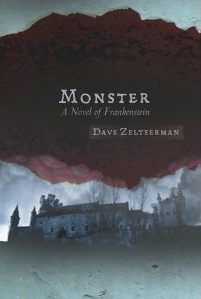
PRO-FILE: DAVE ZELTSERMAN
1. Tell us about your current novel or project.
MONSTER is my Frankenstein retelling. The idea behind it is that everything a dying Victor Frankenstein told Captain Walton were outrageous lies to protect his reputation, and the monster now gets to tell the real story. In my version Victor is a fiend who’s working with the Marquis de Sade to bring their version of Hell to earth. The book is written in a faux gothic style to sound like Mary Shelley, but to be much easier for the modern reader to read. It also has the same extensive roadmap as Shelley’s book: Ingolstadt, Germany, Geneva, Swiss Alps, London, Scotland, Ireland, back to Geneva and finally to the Artic, but the traveling is done for very different reasons.
The hardcover and ebook versions were released last year, with the paperback coming out early 2014, and Booklist Magazine recently picked it as one of the 10 best horror novels over the last 12 months, and NPR Boston picked it as one of the best books of 2012.
2. Can you give us a sense of what you’re working on now?
I’m working on a thriller titled The Fantasmi. A billionaire and his family find themselves being hunted by a powerful secret society called the Fantasmi, and they have no idea why this is being done or what they can do to stop it. This book has constant surprises and twists, and things are flipped around several times, and has been a lot of fun to write so far.
3. What is the greatest pleasure of a writing career?
The actual writing! I thoroughly enjoy every aspect of the writing process, and there’s no better feeling than when you disappear in your writing.
4. The greatest displeasure?
The business side of things!
5. Advice to the publishing world?
I have no idea what advice I could give them. While I’d like to say publish what they love instead of what they cynically decide will be commercially successful, with everything changing as fast as it is thanks to ebooks, I’m sure they are far more aware of what they need to do to survive and prosper than I am.
6. Are there any forgotten writers you’d like to see in print again?
I recently started reading Fredric Brown’s The Screaming Mimi and The Fabulous Clipjoint, and loved both those books, and am now being recommended certain titles that are out of print. So for a purely selfish reason, I’d like to all of Brown’s books back in print.
7. Tell us about selling your first novel.
Fast Lane was the first piece of fiction I wrote with the idea of publishing. It’s a very dark piece of psycho noir, and after having no luck selling it to a US publisher, I self-published it on iUniverse through a program they had with MWA. Some noir readers on Rara Avis started talking about it, which got a fellow who translates for Italian presses to read it, and he convinced one of the Italian publishers he was working with, Meridiano Zero, to buy it. Later the tiny micro press, Point Blank Press, which published first books from Allan Guthrie, Duane Swierczynski and Ray Banks, also published Fast Lane, but my first book sale was for the Italian translation of Fast Lane.[image error]
Published on August 16, 2013 14:45
PRO-FILE: LIBBY FISCHER HELLMAN
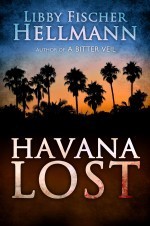
PRO-FILE: LIBBY FISCHER HELLMAN
1. Tell us about your current novel or project.
HAVANA LOST, my 10th thriller, is the third (and probably final) entry in my so-called “Revolution Trilogy.” Set largely in Cuba, it begins in 1958 during the Cuban revolution. Then it jumps to Cuba’s Special Period and then to the present in Chicago. Like my previous thrillers SET THE NIGHT ON FIRE and A BITTER VEIL, it is steeped in historical detail, but unlike those novels, which veered into literary thriller territory, HAVANA LOST stays closer to the genre by tracking the rise of a female Mafia boss. We see her as a young idealistic woman, a worried mother, and then a confident mature woman who happens to be on the wrong side of the law. Of course, she must deal with the repercussions and consequences of her actions.
2. Can you give us a sense of what you’re working on now?
I’m trying to finish up a Georgia Davis PI novel that I originally started four years ago before I got sidetracked with the novels mentioned above. It will be the fourth entry in the Georgia Davis series. It’s quite darkl in fact, it’s taking me to a darker place than I ever thought. So I’m think I’ll need to write an Ellie Foreman novella or novel after that. Ellie has a dry sense of humor that I’ve missed, and I need to lighten up.
3. What is the greatest pleasure of a writing career?
Having written.
I hate the process itself. Writing is the most difficult thing I’ve ever done, and even after 15 years, I still feel unequal to the task. I always second-guess myself. I feel vulnerable and insecure. I write slowly, and I can be easily distracted.
But when it’s over, and I’m actually holding the book in my hands (or seeing the ebook fly off the shelves… well,… that’s a pretty awesome feeling.
4. The greatest displeasure?
I think I just told you.
5. Advice to the publishing world?
Oh, Ed, that’s sooo difficult these days. Of course I have lots of advice, but the issue is whether it’s of any use. We’re still in the throes of fundamental change and most of us are in rough seas looking for or clinging to a life preserver (including authors with the Big Five).
It’s much easier to tell you what the problems are than to offer advice. The biggest problem is “Discoverability,” and it affects both indie and traditionally published authors. How does a new or midlist or even an established author break through the junk and clutter and noise? Even someone like JK Rowling had to be “outed” in order for her book to get decent sales. If anyone has any ideas, I’m all ears.
6. Are there any forgotten writers you’d like to see in print again?
Well, technically, he’s still in print, but I’d like to see a renaissance of Jerry Healy’s John Cuddy series. What pleasure those novels gave me!
7. Tell us about selling your first novel.
It’s going to sound like a Cinderella story, but it isn’t. I finished AN EYE FOR MURDER, queried agents, and got one two weeks later. Ten weeks after that, she sold it to Berkeley Prime Crime for a 3 book deal.
Overnight success, right?
Wrong. Here’s the real story. AN EYE FOR MURDER was the fourth novel I wrote. I’m nothing if not stubborn, and when I set my mind to writing a publishable novel, I stayed with it. After three unsuccessful attempts to sell several police procedurals, though, the agent I had managed to acquire dropped me, saying something along the lines of “I think you need to change your voice. And your characters. And your plots. And your agent, because I don’t want to represent you any more.”
After I picked myself up off the floor, having consumed liberal amounts of wine and shed liberal amounts of tears, I decided to follow his advice. I switched to first person, “discovered” an amateur sleuth named Ellie Foreman who is a Chicago video producer and a single mother, (just like me – what a coincidence!)…and told a story about her family that harks back to World War Two.
It finally worked. I got another agent quickly, and she sold it, and the rest, as they say, is history. So I suppose I was an overnight success – five long years in the making.
------
Published on August 16, 2013 04:54
August 15, 2013
Biggest book news of the summer: House of The Fatted Penguin
House Of The Fatted Penguin
Ed here: Thanks to Kris Rusch's fantastic blog I linked to this and read it. This is by Tom Dupree.When you're finished go to Kris's commentary on it. http://kriswrites.com/2013/08/14/the-...
 Today’s big book news is Apple’s loss in the Department of Justice antitrust action alleging that it colluded with five major trade book publishers to fix prices of e-books. (The publishers themselves settled out of court; Random House, which did not adopt Apple’s “agency model” of pricing for another year, was not named.) We now await the financial penalty and the inevitable appeals. But for my money, that’s not the biggest book news of the month. Neither is Barnes & Noble’s planned abdication of its e-book reader Nook, and the related resignation of its CEO, as part of the slow, sad decline of a once mighty, even arrogant, behemoth that dictated how you get books to a mass market – if B&N didn’t like a cover, you frickinchanged it – and rented out its front-of-store promotional space like the commodity this print-payola became. These are titanic events which will affect most of you who like to read books for fun, and would lead the news in any other month. But not in July 2013. Not the month when Penguin Random House was born.As of July 1, in the wink of an eye, there were no longer a Big Six of trade publishing, only a Big Five. Later this year, we may well hear of another proposed consolidation; my old compadres at News Corp‘s HarperCollins (who sniffed around Penguin as well, but too late) are rumored to be holding powwows with CBS’s Simon & Schuster. Hachette (used to be Warner) and Macmillan are the only other Bigs, and if a Harper/S&S merger took place, they’d probably have no choice but to get married themselves.Why?First, leverage. The power in the book business is shifting in favor of one mega-retailer, and this shift is happening at electronic speed, a pace to which traditional publishers are unaccustomed. That ogre is Amazon, so huge that it could afford to establish its Kindle as the dominant e-reading platform by pricing bestsellers at a loss. Take pricing power away from publishers and they get mad – and DoJ asserts that five of them got even. I’ve never understood why the Big Six didn’t just say OK, these e-books are great and all, but they’re cannibalizing our hardcover sales, so tell you what: no e-editions on new titles for the six months after laydown. After all, movie marketers “window” the crap out of their new releases: premieres in theaters, pay-per-view, home video, pay cable, streaming, etc., are all staggered to squeeze out every possible dime. But the e-market was jump-started instead by “loss-leader” pricing (which even bled over into a ludicrous price war on physical books between Amazon and Wal-Mart in late 2009, when for one brief shining moment you could buy Stephen King’s thousand-page marathon UNDER THE DOME in hardcover for $9.00), after years of half-hearted, impotent, premium-priced effort within the industry.
Today’s big book news is Apple’s loss in the Department of Justice antitrust action alleging that it colluded with five major trade book publishers to fix prices of e-books. (The publishers themselves settled out of court; Random House, which did not adopt Apple’s “agency model” of pricing for another year, was not named.) We now await the financial penalty and the inevitable appeals. But for my money, that’s not the biggest book news of the month. Neither is Barnes & Noble’s planned abdication of its e-book reader Nook, and the related resignation of its CEO, as part of the slow, sad decline of a once mighty, even arrogant, behemoth that dictated how you get books to a mass market – if B&N didn’t like a cover, you frickinchanged it – and rented out its front-of-store promotional space like the commodity this print-payola became. These are titanic events which will affect most of you who like to read books for fun, and would lead the news in any other month. But not in July 2013. Not the month when Penguin Random House was born.As of July 1, in the wink of an eye, there were no longer a Big Six of trade publishing, only a Big Five. Later this year, we may well hear of another proposed consolidation; my old compadres at News Corp‘s HarperCollins (who sniffed around Penguin as well, but too late) are rumored to be holding powwows with CBS’s Simon & Schuster. Hachette (used to be Warner) and Macmillan are the only other Bigs, and if a Harper/S&S merger took place, they’d probably have no choice but to get married themselves.Why?First, leverage. The power in the book business is shifting in favor of one mega-retailer, and this shift is happening at electronic speed, a pace to which traditional publishers are unaccustomed. That ogre is Amazon, so huge that it could afford to establish its Kindle as the dominant e-reading platform by pricing bestsellers at a loss. Take pricing power away from publishers and they get mad – and DoJ asserts that five of them got even. I’ve never understood why the Big Six didn’t just say OK, these e-books are great and all, but they’re cannibalizing our hardcover sales, so tell you what: no e-editions on new titles for the six months after laydown. After all, movie marketers “window” the crap out of their new releases: premieres in theaters, pay-per-view, home video, pay cable, streaming, etc., are all staggered to squeeze out every possible dime. But the e-market was jump-started instead by “loss-leader” pricing (which even bled over into a ludicrous price war on physical books between Amazon and Wal-Mart in late 2009, when for one brief shining moment you could buy Stephen King’s thousand-page marathon UNDER THE DOME in hardcover for $9.00), after years of half-hearted, impotent, premium-priced effort within the industry.for the rest go here:http://tomdup.wordpress.com/2013/07/1...
Published on August 15, 2013 15:12
August 14, 2013
Forgotten Books: Loan Shark by J.W. O'Dell
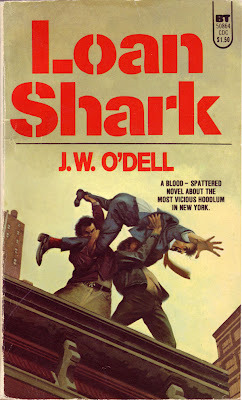
--------------------------LOAN SHARKEd here: By accident I ran across this blog called Olman's Fifty and it turned out to be one of the most fascinating review blogs I've ever read. He covers everything from pulp to literary novels. What made me a fan immediately was his review of the following novel. I've quoted Terry Southern before who always talked about all the great and sometimes memorable trash that could be found at the bottom of the literary totem. Belmont-Tower was certainly at or near the bottom but every once in awhile they did manage to publish a decent book---in fact so many it might surprise you. I read this when it first appeared and have a read it once or twice since. This is dark bleak pulp at its mordant agitated best. I don't know who O'Dell was (for a time I thought he might be Peter McCurtin who worked and published there and it still might be) but he gave a minor book bitter and truthful life. The pulse and pace and characterization of this novel can only be evied by many of O'Dell's literary betters. THIS SHOULD BE REPRINTED.Tuesday, March 27, 2012
Published on August 14, 2013 13:14
Scott Phillips' Latest Foray Into the Sexually Bent, the Noirest of Noir
Scott Phillips' Latest Foray Into the Sexually Bent, the Noirest of NoirGuest blog: Thanks for novelists like Phillips for getting down and dirty, which he does with aplomb in "Rake" FROM THE WRAP
Published: August 14, 2013 @ 12:34 pmPost a CommentPrint This Page
00
inShare
By Carole Mallory
Scott Phillips, the author of “The Ice Harvest” that was made into a movie starring John Cusack with a screenplay by Oscar winner Robert Benton, has written a new novel, “Rake.” It’s about an actor who plays Dr. Crandall Taylor on a daytime soap opera star, who travels to his beloved Paris where his latest American soap, “Ventura County,” watched by the loneliest and horniest housewives, is being broadcast on primetime.“Crandall” (Phillips never gives our badass antihero a name other than his name on his soap) is a star not only to television audiences but to women who want to experiment in their boudoir. His appetite for kinky sex combines with Phillips’ talent for writing the unthinkable. One character is having sex with his sister so that he can give her VD. (“Rake” is not for the faint of heart).French stardom on the telly does not satiate Crandall’s narcissism. He wants to produce a movie. On a visit to the Louvre to see the “latest hits,” he comes upon the idea of writing a movie about what happened to the arms of Venus de Milo?Four affairs later, Crandall has landed a backer. This would-be-producer wants his wife to star. Natch. Meanwhile, Crandall is having an affair with the producer’s wife. “She found extramarital sex just as exciting in the marital bed,” Phillips writes.His keen cultural observations echo his raison d’être. “I always forget the French reluctance to speak about money, even to discuss what one does for a living. Whereas for Americans, it’s matters of sex, we don’t discuss,” he writes.How true -- and thanks for novelists like Phillips for getting down and dirty, which he does with aplomb. Yet as wicked as Crandall is, Phillips manages to have the reader care about him. Shades of James M. Cain and Raymond Chandler abound in this masterful tomb.Soon Crandall’s sexual appetite bites him in the behind and his psychopathy takes over. Laughs end as you eagerly await Phillips’ next foray into the absurdity of the twisted, the sexually bent and the noirest of noir.
Published on August 14, 2013 13:10
August 13, 2013
PRO-FILE: BILL CRIDER
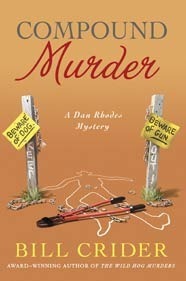
PRO-FILE: BILL CRIDER
1. Tell us about your current novel or project.
The latest book in the Sheriff Dan Rhodes series is Compound Murder. It came out from St. Martin’s on August 13, and it’s another of the sheriff’s continuing adventures in Blacklin County, a small, imaginary place somewhere in East Texas. If it weren’t imaginary, it would be widely known as “the murder capital of Texas,” since there’s always someone getting killed there. It’s like Cabot Cove. Nobody with any sense of self-preservation would want to live there or vacation there because of the high murder rate. There are also wild hogs. Aside from that, however, it’s a nice little place.
2. Can you give us a sense of what you’re working on now?
There’s a professional organization of western writers called Western Fictioneers. Some of the members have been writing a series of collaborative novels about the fictional town of Wolf Creek. Troy Smith is the general editor for the series. Wolf Creek’s a little like Blacklin County, in that all kinds of bad things happen there, though as far as I know there aren’t any wild hogs. Yet. Anyway, I’m currently writing a chapter for Volume 8 in the series. It’s called Night of the Assassins. My character throughout the series is the local schoolmarm, who just happens to be not quite what she seems. She goes by the name of Cora Sloane, but she’s really Amanda Hall, wanted for the murder of a lawman. (She’s innocent, but the law doesn’t think so.) She looks prim and proper, and she carries a Colt’s Navy in her bag. There’s a lot going on in the Wolf Creek books, and western fans should give them a try.
3. What is the greatest pleasure of a writing career?
I enjoy the process of writing. Some people say they enjoy having written, but I get a lot more fun from the writing itself. If I weren’t writing fiction and selling it, I’d be writing something else. I wrote a lot of things for a long time with no thought of payment, just because it was fun to write. Come to think of it, I still do that kind of thing.
4. The greatest displeasure?
There’s no real displeasure with the writing, but it’s no fun to have somebody tell you that what you’ve written is no good. I also don’t like the business part of writing. My mind doesn’t work like that. Luckily my wife, Judy, has great business sense. She’s organized and knows what’s what. Another thing I don’t care for is proofreading my manuscripts. Judy’s my first reader and editor. She does a terrific job and saves me a lot of time.
5. Advice to the publishing world?
Sell more of my books.
6. Are there any forgotten writers you’d like to see in print again?
The good news is that plenty of forgotten writers are getting reprinted now, thanks to publishers like Stark House and Prologue Books. There’s not much Lionel White, though. And Charles Williams. Those two deserve more new editions than they’ve had, for sure.
7. Tell us about selling your first novel.
That would be the famous Nick Carter novel called The Coyote Connection. I wrote it with a friend, Jack Davis, who came up with the idea of writing about Middle Eastern terrorists being smuggled across the Texas-Mexico border. This was in 1981, so we were ahead of the curve. Jack did an outline and a (very) rough draft. We finished the book and sent it to the publisher of the series. My guess is that one of the regular writers failed to turn in his book one month, and the editor was desperate for something to fill the slot. Our book happened to be there, and it was the right length, so the editor slipped it in. And that’s how I became a famous writer.
Published on August 13, 2013 17:56
August 12, 2013
PRO-FILE: MAX ALLAN COLLINS
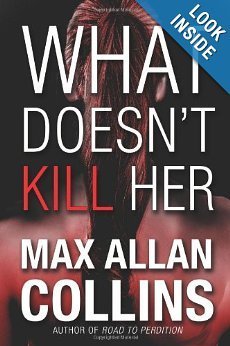
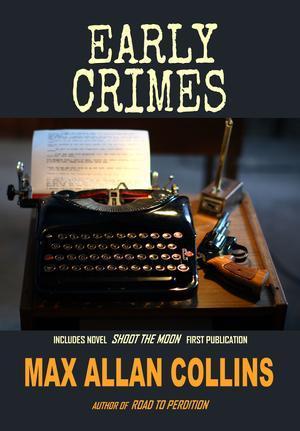
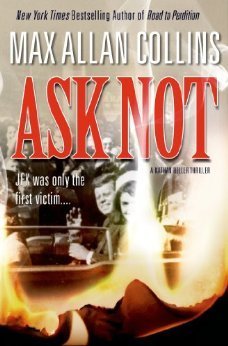
Ed here: I recently finished Early Crimes by Max and it's a fine read all the way through. It demonstrates that he had the right stuff from the git-go. He was as good in his teens as some writers are in their Thirties.
PRO-FILE:MAX ALLAN COLLINS
1. Tell us about your current novel or project.
Three books are coming out, one right after another, in August, September and October. I don't relish this, since it's hard for each book to receive whatever its just attention might be, plus I can just see the "Collins just keeps crankin' 'em out" remarks coming in reviews. But this is just one of the vagaries of publishing, which even the most moderately prolific author endures, since publishers pay little or no heed to what a writer's other publishers are up to.
EARLY CRIMES from Perfect Crime is a collection of sorts -- a short story, a novella and a previously unpublished novel. These are all early works, the first two from the very beginning of my professional writing career. The novel, SHOOT THE MOON, was a book my then-agent refused to show around. It was written fairly early on, but after I'd made my first novel sales, including the initial Nolan, Mallory and Quarry novels. I always thought it was publishable, and of all my novels it shows most the Westlake -- as opposed to Richard Stark -- influence on my work, as it's a comic caper novel. Initially Perfect Crime was going to bring just the novel out, but I requested that it be part of a collection, because I feared how people might react to it on its own. I think the context of gathering all of my uncollected early work provides it some cover, frankly.
WHAT DOESN'T KILL HER is a thriller, my first original novel for Amazon's Thomas & Mercer line, who have done so well reprinting my backlist titles. The early reaction has been mixed, as some of the Amazon advance reviewers seem pissed off at me for not writing what they see as my usual historical fare. Readers who've been with me for a while know that I hop around some. I specifically wanted to accomplish two things -- first, I wanted to give an American twist to the kind of strong young female protagonist that resonated so well with readers in GIRL WITH THE DRAGON TATTOO; and second, I wanted to do a thriller that did not include the superstar forensics teams of my CSI, BONES and CRIMINAL MINDS tie-in novels, and the two J.C. Harrow thrillers I did with Matt Clemens at Kensington. This is about real people, specifically members of a Victims of Violent Crimes support group, who have to draw upon their everyday skills and abilities to try to track down a killer that the authorities don't believe exists. I think it came out very well, and I believe the overall reaction will be positive. By the way, Matt Clemens assisted on this all the way, and though he doesn't share the byline, he gets a full-page credit inside the book.
ASK NOT is the new Nate Heller novel and it's the third of my JFK Trilogy. Funny thing -- JFK himself appears in only one scene in the trilogy. ASK NOT focuses on the suspicious number of assassination witnesses who wound up dead in the year or so after the crime. Advance reviews on this one have been really, really good, I'm relieved to say. Handling the JFK tragedy in a Heller novel has been a goal I've been heading toward since the very beginning, back in 1983, when TRUE DETECTIVE came out. I always figured it would be the final Heller novel, but now I'm thinking about doing the RFK and Martin Luther King assassinations as well, and maybe Watergate. I hope ASK NOT benefits from the 50th anniversary of the assassination generating general public interest and media attention. Despite the countless non-fiction books on the subject (using the term "non-fiction" for some of the books is generous), I think ASK NOT breaks some significant new ground.>> 2. Can you give us a sense of what you’re working on now?
Coming up is a second thriller for Thomas & Mercer, SUPREME JUSTICE, a political novel. After that I'll be doing ANTIQUES SWAP with my wife Barb -- we do those novels under the joint byline "Barbara Allan" -- and another Mike Hammer, working from a Spillane partial manuscript. I'm thrilled that Titan has commissioned three more Hammers, as there's still significant unpublished Spillane material there to complete. And of course I'm crossing my fingers that the HBO/Cinemax pilot of QUARRY gets picked up as a series, because the contract assures me of writing two episodes per every ten. The two writers who wrote the pilot, Michael D. Fuller and Graham Gordy, did a great job and are real fans of the books, so working with them should be a pleasure.>> 3. What is the greatest pleasure of a writing career?
I think there are two, and these are intertwined. First, and I mean this in a not wholly facetious way, avoiding what most people consider "honest labor" -- you know, a "real" job. Those of us who can make a living doing this, which for all of us began as a love and a hobby, is a fantastic blessing. Second, there's the satisfaction of holding the physical object that is your book in your hands -- to flip through it, look at it front and back, even smelling the damn thing. If you grew up loving books, that's a pleasure beyond pleasure.>> 4. The greatest displeasure?
There are plenty of those, starting with the uncertainty of the freelance life. On one day, I lost my DICK TRACY scripting job and had my current Nate Heller contract cancelled -- that was a rough time that Marty Greenberg got me through by giving me short story assignments...a guy named Gorman pitched in on that effort. But on a day to day basis, I think it's bad reviews, especially unfair ones. You can't respond to them, or at least you're not supposed to. I do, on occasion, to my son's dismay. I have never taken criticism well, and that's not a good trait in a writer. You need a thick skin. I don't really have one. What I do have, though, is resilience. I can get up and dust myself off and get right back at it. >> 5. Advice to the publishing world?
Don't fear the future -- look at ways to exist and thrive in it. As a corollary, treat writers with consideration and respect -- "content providers" are your partners and the life blood of publishing, not just a necessary evil.>> 6. Are there any forgotten writers you’d like to see in print again?
I am pleased to have seen, and even helped a little, at getting Ennis Willie back into print. The e-book revolution has brought a lot of things back into availability, if not "print" exactly. I would like to see William March, author of THE BAD SEED, back in print and given the standing he deserves. He's a wonderful writer and an artist -- sort of a coherent Faulkner. On the detective side, I'd like to see Mike Roscoe's oddly poetic Johnny April mysteries get a new lease on life -- DEATH IS A ROUND BLACK BALL. What a title.>> 7. Tell us about selling your first novel.
It was Christmas Eve, 1971. I was at my low ebb. Agent Knox Burger had had my first two novels, BAIT MONEY and NO CURE FOR DEATH, for a long, long time, getting nowhere. BAIT MONEY, two years, easy. NO CURE FOR DEATH, a year or so. I had been teaching at a community college since September, still going to the University of Iowa for my last sessions at the Writers Workshop, and I feared that I would never be published. I hated teaching and that was looking like my future, since it was the only job I'd prepared for, other than bussing tables and sacking groceries. I had broken down in tears about this just days before to my lovely, understanding wife, Barb, who never lost faith in me. Then on Christmas Eve, the letter from Knox Burger arrived -- Curtis Books had bought BAIT MONEY. (On the next Christmas Eve, BAIT MONEY and the sequel I'd written immediately after the sale, BLOOD MONEY, arrived in freshly minted paperback.) NO CURE FOR DEATH sold to Curtis a week after BAIT MONEY. My mentor Don Westlake said, "Sometimes God acts like O. Henry and there's nothing to be done about it."
Published on August 12, 2013 14:20
August 11, 2013
Marilyn Monroe and Howard Hawks
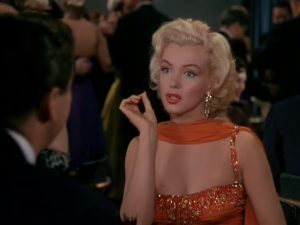
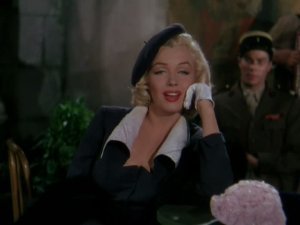
Ed here: Marilyn Monroe is in the news again because there's another one of those "true" books about her. This one has her calling up Jackie O and fessin' up to lockin' lips with JFK. This allegedly came from the late Peter Lawford who made a point of being sober at least fifteen minutes a day. I don't trust any of these books. I don't believe J Edgar Hoover was a cross-dresser and I certainly don't believe that Erroll Flynn was a gay Nazi spy. When would he have time? He was always servicing fifteen year old girls. But that's the biz. You can't libel the dead. Anyway David Kalat's been writing a long and interesting series of articles about Howard Hawks over at Movie Morlocks. Since MM is in the news I thought you might be interested in this episode. For the whole thing:http://moviemorlocks.com/2013/08/10/t...
David Kalat:
There’s a phrase—oil and water. It’s meant to suggest that two people are of such disparate temperaments that they can’t mix, like oil and water. But that metaphor is a limited—oil and water may not mix, but they are such inert things. But try mixing potassium and water and see what happens—they don’t mix either, but stuff explodes. And that’s our metaphor for today—because putting Howard Hawks in the same room as Marilyn Monroe and expecting anything other than stuff exploding was madness.I’ve spent the last couple of weeks exploring Howard Hawks so if you’ve been tuning in, you should have a pretty good sense by now of the main problem here: Hawks was a proponent of an unself-conscious, almost improvisational approach to acting. He wanted unstudied, unrehearsed naturalism. And he was prepared to resort to dirty tricks to get it.Meanwhile, Marilyn Monroe was an insecure little rabbit who relied almost pathologically on her acting coach, Natasha Lytess. And one of Lytess’ tools to keep Monroe’s paranoia in check was to insist on endless retakes.
 Hawks had no problem with remakes, but retakes weren’t his bag, baby. If the first take wasn’t usable, he figured it made no sense to ask the actors to do it again, he’d just write a new scene and have them go do that one instead.So, how do you think Hawks responded to Lytess’ repeated calls for retakes? Did he respond calmly and reasonably, accommodating his nervous star’s insecurity? (Let me remind you here that we are talking about a man with a mangled hand, a souvenir left over from punching Ernest Hemingway for no reason other than that it seemed like a good idea at the time).Nope. Hawks banned Lytess from the set.This had the predictable effect: Marilyn figured if her drama coach wasn’t welcome on set anymore, then they didn’t really want her to act, so why bother showing up for work at all?Studio chief Darryl Zanuck wanted to know why the production seemed to have ground to a halt. Hawks offered three suggestions for solving the logjam: fire Marilyn Monroe, fire Howard Hawks, or not shoot the whole movie.
Hawks had no problem with remakes, but retakes weren’t his bag, baby. If the first take wasn’t usable, he figured it made no sense to ask the actors to do it again, he’d just write a new scene and have them go do that one instead.So, how do you think Hawks responded to Lytess’ repeated calls for retakes? Did he respond calmly and reasonably, accommodating his nervous star’s insecurity? (Let me remind you here that we are talking about a man with a mangled hand, a souvenir left over from punching Ernest Hemingway for no reason other than that it seemed like a good idea at the time).Nope. Hawks banned Lytess from the set.This had the predictable effect: Marilyn figured if her drama coach wasn’t welcome on set anymore, then they didn’t really want her to act, so why bother showing up for work at all?Studio chief Darryl Zanuck wanted to know why the production seemed to have ground to a halt. Hawks offered three suggestions for solving the logjam: fire Marilyn Monroe, fire Howard Hawks, or not shoot the whole movie.
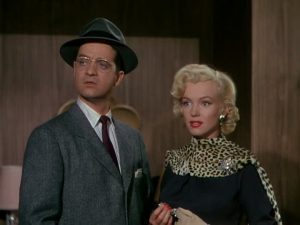 In the end, they settled on a fourth option: Hawks recanted, and allowed Lytess to return. And if she wanted to have Marilyn run through dozens of takes, why not? Of course, there was no law that said they actually had to have film in the camera for those retakes.The thing is, this wasn’t the first time Hawks and Monroe had worked together. He had to have known what he was getting into. But that raises the question of why Howard Hawks was making this movie at all.This was in no way Hawks’ comfort zone—he was working in color for the first time, and wasn’t otherwise inclined towards musical comedies—in fact, he was so out of his element in the musical numbers he delegated them to choreographer Jack Cole.
In the end, they settled on a fourth option: Hawks recanted, and allowed Lytess to return. And if she wanted to have Marilyn run through dozens of takes, why not? Of course, there was no law that said they actually had to have film in the camera for those retakes.The thing is, this wasn’t the first time Hawks and Monroe had worked together. He had to have known what he was getting into. But that raises the question of why Howard Hawks was making this movie at all.This was in no way Hawks’ comfort zone—he was working in color for the first time, and wasn’t otherwise inclined towards musical comedies—in fact, he was so out of his element in the musical numbers he delegated them to choreographer Jack Cole.
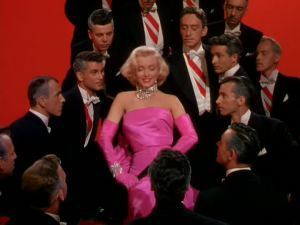 And for that matter, let’s pause a moment and consider these musical numbers.
Gentlemen Prefer Blondes
had been a 1925 book by the fabulous Anita Loos, which spawned a long-running Broadway adaptation. Hawks was ostensibly making a film version of the play, but the play didn’t have much of a workable plot, so he was rewriting it extensively with Charles Lederer, and the rewrite entailed discarding a fair number of the famous songs from the stage version—a decision which somewhat calls into question the logic of making a movie version of the show in the first place.And if the whole point of the thing seemed to be a justification for 90 minutes worth of breast jokes, Hawks seemed blithely unaware of the sex appeal of his two stars. In one of the strangest things anyone has ever said, Hawks said of Marilyn Monroe and Jane Russell “I never thought of either of them as having any sex.” They just weren’t his type.
And for that matter, let’s pause a moment and consider these musical numbers.
Gentlemen Prefer Blondes
had been a 1925 book by the fabulous Anita Loos, which spawned a long-running Broadway adaptation. Hawks was ostensibly making a film version of the play, but the play didn’t have much of a workable plot, so he was rewriting it extensively with Charles Lederer, and the rewrite entailed discarding a fair number of the famous songs from the stage version—a decision which somewhat calls into question the logic of making a movie version of the show in the first place.And if the whole point of the thing seemed to be a justification for 90 minutes worth of breast jokes, Hawks seemed blithely unaware of the sex appeal of his two stars. In one of the strangest things anyone has ever said, Hawks said of Marilyn Monroe and Jane Russell “I never thought of either of them as having any sex.” They just weren’t his type.
Published on August 11, 2013 10:33
August 10, 2013
Still one of my all-time favorite noirs: D.O.A.
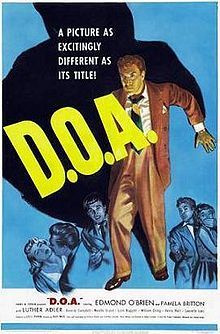
February 12, 2011 By Film Noir Blonde sD.O.A./1950/United Artists/83 min.Ed here: No matter how many times I see this it grips me. One of the most original and dazzling plots of all time rendered by an adventurous director and an almost perfect cast--D.O.A. is a B masterpiece.
“I don’t think you fully understand, Bigelow,” says a doctor to his shocked patient, “you’ve been murdered.”
This is the premise for 1950’s “D.O.A.,” directed by Rudolph Maté, a classic noir about a standup, solid guy from Banning, Calif., named Frank Bigelow (Edmond O’Brien) who, while on a trip to San Francisco, learns he has been poisoned with a time-released fatal toxin. He has just a few days to find his murderer. And here he thought it was just a hangover.
It’s particularly bad luck because Bigelow hasn’t served time, he doesn’t play the horses, he’s not eyeing easy money. He is a self-employed accountant in a small town near Palm Springs minding his own business. True, he does like hard liquor, is a bit of a skirt chaser and he’s on the fence about committing to doting girlfriend Paula Gibson (Pamela Britton), but those are minor flaws in the noir scheme of things.Even though Bigelow is dying, his genetic tough-guy instinct kicks as he abandons his ledger book and adding machine to follow clues, talk tough, tote a gun and chase his prey. Clearly, he missed his calling as a macho gumshoe who could give Phillip Marlowe or Sam Spade a run for their money.Checking in via phone calls to Paula, who also happens to be his secretary, he learns that a Mr. Phillips, an importer-exporter in Los Angeles, has been urgently trying to contact him. Bigelow returns to LA but, before he can probe for info, Phillips takes a flying leap from a tall building. So, Bigelow taps Phillips’ inner circle: his brother Stanley (Henry Hart), his wife (Lynn Baggett), his secretary Miss Foster (Beverly Garland, credited as Beverly Campbell), and co-worker Halliday (William Ching).Turns out that Bigelow’s connection to these Angelinos is that six months prior, he notarized a bill of sale for a shipment of iridium. Phillips bought the stuff from a mysterious man named George Reynolds.
for the rest go here:
http://www.filmnoirblonde.com/‘d-o-a-...-
ultimate-inspiration-to-solve-a-murder-when-it’s-your-own/
Published on August 10, 2013 13:32
Ed Gorman's Blog
- Ed Gorman's profile
- 118 followers
Ed Gorman isn't a Goodreads Author
(yet),
but they
do have a blog,
so here are some recent posts imported from
their feed.



